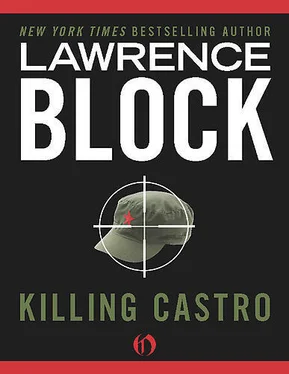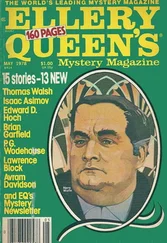The convoy kept coming. The plan was a simple one—they were to hold fire until the lead Jeep came abreast of the position held by Garth on one side and a man named Jiminez on the other. Then they would open fire. Garth and Jiminez were to shoot down the lead vehicles, blocking the road at the front. Sardo and a few others would be doing the same to the Jeeps at the rear of the procession. That would keep Castro in the middle, would prevent the big Lincoln limousine from escaping either to the front or to the rear.
The rest was up to the rebels in the center, to Manuel and Maria and Fenton and to one or two more. They would level their guns at the Lincoln, going for Castro, for the big fish in the pond. It would be easier with a few grenades or a bazooka, Fenton thought. Something that would stop a Jeep with a single shot. It was harder when you had to make Sten guns do all the work.
And then he stopped thinking, because the time was coming.
The Lincoln was in range now. Fenton looked directly at it, looked at the gleaming metal, the drawn curtains. He steadied himself and his gun, pointing the barrel at one of the windows in the rear. At any moment Garth and Jiminez would start shooting. That would be his cue.
Damn it all, go on!
His heart stopped beating for those two seconds. He had an awful premonition of disaster and death that refused to leave his mind. His hands gripped the Sten gun shakily.
Then a shot rang out.
Fenton turned into a machine. He sprawled on his belly and held the Sten gun’s trigger down, spraying bullets against the window of the Lincoln. But things happened quickly, too quickly. The government forces reacted with the speed of light, almost as if they had been waiting for the shot with the same rapt attention Fenton himself had displayed. The lead Jeep spun off the road against the rocks and soldiers piled out of it, guns in hand. The second Jeep peeled off after it, and the canvas-topped truck barreled off to the other side with men spilling out of it on the way. The bullets didn’t stop Castro’s limousine and the other vehicles weren’t piled up in front of it. The road was unblocked.
And the Lincoln limousine went like the wind. The driver pressed the gas pedal to the floor and the big car responded magnificently with the coiled grace of a striking cobra. The car surged forward, the road clear ahead of it, and Fenton’s bullets didn’t seem to be having any effect at all. He tried for the tires and missed. And he knew instinctively that Castro was on the floor, that he had hit the floorboards when the first shot rang out, that he had escaped the trap.
The Lincoln didn’t stop. More gunfire chased it and more gunfire failed to stop the big car. But now their fire was being returned. The soldiers in the road were caught in the middle, with rebels in the rocks on either side. But there were too many of them—fifty or more, Fenton saw, as Jeep after Jeep emptied out men with guns.
His gun chattered again and men fell in the road. He broke open the gun, put in a fresh clip, fired. Returning fire splayed the rock to one side of him as he shrank back instinctively, still holding down the Sten gun’s trigger, still raining bullets on the men in the road.
Manuel’s voice was high, shrill, calling for a retreat. Fenton saw Taco Sardo a short distance down the road. The boy got up to run, but this time no rifle bullet hit him in the leg. This time a machine gun chased him and a line of bullets trailed down his back from his neck to the base of his spine. Taco fell dead and the battle raged on.
Fenton scrambled to his feet, backed away into the woods. It was their only chance, he knew. The government troops would crush them in open battle, even with the superior position the rebels held. Sheer weight of numbers was too much to overcome with a positional advantage. They had to retreat, had to get back into the cover of the jungle. They knew the jungle and the Castristas did not. It was the only chance they had.
Bullets dug up the dirt at Fenton’s feet. He was running now. The weeks in the jungle had toughened him, had made him wise in the ways of war and outdoor living. His feet were sure of themselves, quick and easy on the treacherous paths. He ran back in the direction of the camp, away from the road and the battle.
He saw Garth on one side of him, Maria on the other. They, too, were running. Garth charged on ahead, and Fenton saw Maria raise a pistol to shoulder height. He gaped.
The girl, running, fired the pistol. And Garth caught the bullet in the back of his head.
He pitched forward and died.
Fenton ran, found cover, took it. He steadied himself in a clump of thick brush, replaced the Sten gun’s empty clip with still another one, caught his breath. So Garth was dead—Garth lived through the fighting and died because a woman on his own side hated him enough to shoot him in the back. Garth was dead, and other rebels were dead, and the government troops were still unsatisfied. They wouldn’t let go, wouldn’t just drive on, even though the rebel assault had been crippled. Now they were moving on, into the brush. They wanted to kill the rebels to the last man.
It looked as though they were going to.
Fenton saw Jiminez break for cover from the road. He saw a soldier pull the pin from a grenade, saw him hold it, counting quickly in Spanish. Then he watched the lazy flight of the grenade, soft and fat like a plump bird. Jiminez ran and the grenade followed. Then the grenade dropped to the ground at the feet of Jiminez and the man screamed in terror.
The explosion drowned the scream and Jiminez died in pieces.
The government soldiers pushed on. Fenton let his finger freeze on the Sten gun trigger, let it keep spitting lead at the soldiers. Men died from his bullets faster than he could count them. But there were too many of them, more than he could kill.
He saw a scene on his left, saw two of the soldiers with Manuel. Manuel, who was going to kill Castro and rule in his place. Manuel, who would be the fearless leader of the people, the force around which the enemies of Castro could rally.
Manuel, whose ambitions were drowned now.
They had Manuel. His weapon was on the ground, useless. And Manuel, hero, leader of the people, looked at death and saw its face. Manuel screamed like an injured child and tears streaked his brown face. He screamed and the soldiers laughed at him.
There were two of them. One held a gun to Manuel’s temple while the other castrated Manuel with a bolo knife. Manuel passed out, fell to the ground. Then the soldier with the pistol shot him through the forehead.
Fenton cut them both down with his Sten gun.
The battle went on, halfway to forever. It was twilight, and then it was dark, and at some indeterminable time the Jeep engines roared and the Castristas left their dead behind. Fenton was still in his clump of shrubbery, still safe, still alive. No bullets had touched him. He could not believe this at first but it seemed to be true. The battle was over and he, miraculously, was alive.
He remained in position for several minutes, until the last enemy vehicle was out of sight. Then he moved from the clump of brush and looked at the carnage. Over thirty government soldiers lay dead, some in the road, others in the fields. Garth was dead, Manuel dead and mutilated, Jiminez dead, Taco dead—
Maria was alive. He found her, moaning, in a thicket not far from him. She had been wounded twice. There was a bullet in her abdomen; another bullet had shattered her left leg. She moaned and cursed in Spanish.
He put a splint on her leg. He dug out the bullets from her body, bandaged her wounds. He lit the campfire again and made some soup for her but she refused to eat. He tended her, trying to make her comfortable.
She died around midnight. He sat alone by the fire, smoking a cigarette he had taken from one of the corpses. He was alone, the last remnant. He—the doomed man, the man who had to die. He was alive.
Читать дальше












